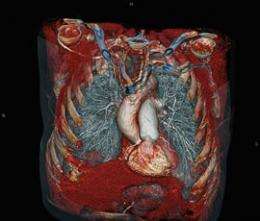Patient research to benefit from cutting edge heart scanner

(PhysOrg.com) -- A state-of-the-art chest scanner, the first of its kind in the UK, will allow doctors and researchers to spot heart problems that were previously undetectable.
The scanner has been installed at the London Chest Hospital, part of Barts and The London NHS Trust.
The scanner will play a major role in cutting-edge research, enabling experts at Barts and The London Cardiovascular Biomedical Research Unit, to explore the best ways to treat heart disease and other cardiac conditions.
It delivers crystal-clear pictures of the heart, allowing earlier detection of heart problems. It is also the fastest in the UK, thereby exposing patients to the lowest possible dose of radiation.
The Siemens Definition Flash CT is regarded as state-of-the-art by clinicians because of its unique ability to perform a detailed scan of the entire heart in just 250 milliseconds - less than half a heart beat. Image quality is still high, even if a moving object is being scanned, such as the heart.
Previously, radiographers using older equipment had to slow the patient’s heart with beta blockers and request that the patient hold their breath for the duration of the scan, in order to achieve sufficiently high-quality clinical images.
Funding for the machine came from a £3.5 million award for biomedical research into cardio-vascular disease from the National Institute for Health Research.
The NIHR has designated Barts and the London NHS Trust and Queen Mary,University of London, a Biomedical Research Unit in advanced cardiac imaging.
Professor Anthony Mathur at The London Chest Hospital said: "This is a frontline diagnostic tool for patients presenting with chest pains.
"It will also be an invaluable tool for helping in the research of new treatments for heart disease, allowing us a much clearer picture of the workings of the heart."
Dr Ceri Davies, clinical director of the newCardiac CT service at the London Chest Hospital, added: "The new machine means patients get a diagnosis of heart disease, while being exposed to a low radiation dose.
"We can look for narrowing of the arteries which would not be visible on the scanners we have now, which are multi-functional and may also deliver a higher dose of radiation.
"A number of patients, who present with chest pain, may not be immediately diagnosed with a heart condition because they are at an early stage and their condition may not be picked up until much later.
"However, thanks to this new machine, we will be able to diagnose these people much sooner and potentially prevent the serious consequences of their heart condition."
Professor Dame Sally C. Davies, Director General of Research and Development and the Department of Health said: "I am delighted that the National Institute for Health Research is able to fund the purchase of this cutting edge new technology.
"Any new technology that allows us to detect heart problems at an earlier stage while exposing patients to less radiation is very good news. The sooner patients know there is a problem, the sooner they can begin to take action to prevent more serious problems later on."
Malcolm Pickering, Regional Sales Manager at Siemens Healthcare said: "The prevalence of heart disease is a growing threat in theUK and the joint efforts of cardiac researchers at Queen Mary, University of London and the The London Chest Hospital will assist in unlocking vital information and improving knowledge.
"As a new standard in CT, the Definition Flash will provide the research team with the speed and image accuracy it needs to enhance research work."
Provided by Queen Mary, University of London (news : web)














